专科英语课堂笔记
大学英语词汇课堂笔记(精华版)
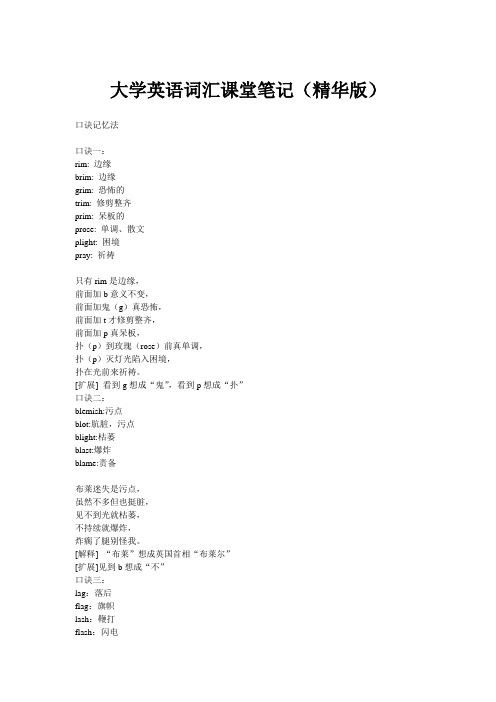
大学英语词汇课堂笔记(精华版)口诀记忆法口诀一:rim: 边缘brim: 边缘grim: 恐怖的trim: 修剪整齐prim: 呆板的prose: 单调、散文plight: 困境pray: 祈祷只有rim是边缘,前面加b意义不变,前面加鬼(g)真恐怖,前面加t才修剪整齐,前面加p真呆板,扑(p)到玫瑰(rose)前真单调,扑(p)灭灯光陷入困境,扑在光前来祈祷。
[扩展] 看到g想成“鬼”,看到p想成“扑”口诀二:blemish:污点blot:肮脏,污点blight:枯萎blast:爆炸blame:责备布莱迷失是污点,虽然不多但也挺脏,见不到光就枯萎,不持续就爆炸,炸瘸了腿别怪我。
[解释] “布莱”想成英国首相“布莱尔”[扩展]见到b想成“不”口诀三:lag:落后flag:旗帜lash:鞭打flash:闪电lame:瘸的flame:火焰are:是flare:熊熊燃烧,闪耀flip:轻击lip:嘴唇flight:飞行light:光落后的旗帜,鞭打着闪电,残废的火焰,是在熊熊燃烧,轻击着嘴唇,飞翔在光中。
口诀四:(by 火舞)light 光delight 高兴slight 轻微的,苗条的alight 点亮的blight 枯萎flight 飞行plight 困境depart 离开只有light才是光,light加s 是灯泡(light)前面加a是点燃,前面加b是枯萎弟弟(de)见光真快乐,(s)在光前真苗条口诀五:fledging:小鸟flake:雪花,薄片flair:本能flaunt:炫耀flock:(禽、畜等的)一群flout:蔑视flatter:溜须拍马,奉承flurry:困惑的,惶惶不安的flack:严厉批评飞在边缘是小鸟,飞入湖中是雪花,飞在空中是本能,飞来的姑姑在炫耀,锁到一起是一群,飞出去却遭到蔑视,后飞来的却在那溜须拍马,只是听起来真是很flurry,缺乏的却是严厉批评。
[解释]1. -ing结尾的指“小的”,如yearling:一岁家畜。
专科大学英语教材笔记

专科大学英语教材笔记一、教材概述专科大学英语教材是专为在大学期间学习英语的专科生设计的。
本教材旨在提高学生的听力、口语、阅读和写作能力,帮助他们在未来的学习和工作中更好地运用英语。
二、教材特点1. 系统性:教材内容按照学习者的英语水平和要求进行分级,从基础到高级逐步展开,使学习者能够循序渐进地提高英语水平。
2. 实用性:教材注重培养学生的实际运用能力,涵盖各个语言技能,如听说读写,并融入与现实世界相关的话题和情境。
3. 全面性:教材全面覆盖了英语的基础知识和技能,包括词汇、语法、听力、口语、阅读、写作等方面,并提供相关练习和活动,帮助学生全面发展英语能力。
三、教材结构教材分为若干单元,每个单元包含以下部分:1. 主题介绍:每个单元以一个主题为中心,介绍该主题的背景和相关内容,激发学生的学习兴趣。
2. 词汇与语法:介绍与主题相关的词汇和语法知识,以帮助学生理解和运用相关的词语和句型。
3. 听力训练:提供与主题相关的听力材料,让学生通过听力练习提高语音识别和理解能力。
4. 口语训练:通过对话、角色扮演等形式,让学生练习口语表达,提高口语交流能力。
5. 阅读理解:提供与主题相关的阅读材料,让学生阅读并理解文章中的信息,培养阅读理解能力。
6. 写作练习:引导学生根据主题进行写作练习,提高写作能力和表达能力。
7. 补充材料:提供一些与主题相关的额外资料,供学生拓展知识和进行深入学习。
四、教材应用1. 课堂教学:教师可以按照教材的内容和顺序进行课堂教学,通过讲解、示范和练习帮助学生掌握和运用知识。
2. 自主学习:学生可以根据教材的指导进行自主学习,通过阅读、听力练习和书面作业提高各方面的英语能力。
3. 辅助教材:教材中的补充材料可以作为教师教学时的额外资料,提供更多的例子和案例,帮助学生更好地理解和应用知识。
五、教材评价专科大学英语教材准确地符合了专科生学习英语的需求,并且整体结构合理,内容丰富,各个语言技能得到充分训练与提高。
英语课堂笔记

英语课堂笔记部门: xxx时间: xxx整理范文,仅供参考,可下载自行编辑Text A Why Are Maps Drawn with North at the Top?本课主要单词1.feature n. 特征,特色;面貌,相貌vi. 是…的特色,以…为特色vi. 重要作用;作为主要角色b5E2RGbCAP1)The most important feature of our work is parentalinvolvement.<我们工作的最重要特色是父母参与。
)p1EanqFDPw 2)The island's chief feature is itsbeauty.<这个岛的主要特色是风景秀丽。
)DXDiTa9E3d3)He is very familiar with the geographical featuresof thisdistrict. <他对这一地区的地理特征很熟悉。
)RTCrpUDGiT4)The boy was slightly taller than his father, withfine features.<那个男孩比他父亲稍高,长得眉清目秀。
)5PCzVD7HxA5)Round-the-clock service features thisstore.<日夜服务是这家商店的特色。
)jLBHrnAILg6)The new type of car features high speed, small sizeand low cost.xHAQX74J0X<这种新型汽车以高速、小型和低费用为特色。
)7)Sea food features largely in the diet of thesepeople.<海产在这些人的食物中占重要地位。
)LDAYtRyKfE8)He is featuring in a new movie.<他正在一部新片中担任主角。
英语课堂笔记24

Text A saving the rainforests for future generations本课主要单词1. rainforest n. 热带雨林这是一个由名词rain加名词forest构成的复合名词。
用rain加名词构成的复合名词,英语中还有不少。
如:rainbelt (雨带),rainworm (蚯蚓)等等。
2. economic adj. 经济(上)的,经济学的economic是economy的形容词形式,economical也是economy的形容词形式,请看下面的例句,注意区别economic和economical。
1)economic:concerned with economics and with the organization of money industry, and trade of a country, region, or social groupeconomic growth (经济增长) economic prosperity (经济繁荣)economic decline (经济衰退) economic reform (经济改革)economic order (经济秩序) economic depression (经济萧条)economic crisis (经济危机) economic doctrines (经济学说)2)economical:cheap,careful,efficientThis car is economical to run. (开这辆车费用很省。
)The child is so economical that he saves all his pocket money. (那个孩子很节省,他把零花钱都积攒了起来。
)形容词economic和economical的副词形式都是economically。
This region is unevenly developed economically. (这一地区的经济发展不平衡。
怎样做英语课堂笔记
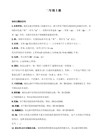
有的同学喜欢将笔记记在课本里,例如,在重要的词、短语和句子下面划线,在书页边写简短说明;有的则喜欢利用笔记本,将重点要点全都写出来。究竟英语学科的课堂笔记应该如何做呢?
1.做符号。
就是在原文旁加上各种符号,如直线、双线、黑点、圆圈、曲线、箭头、红线、蓝线、三角、方框、着重号、惊叹号、疑问号等,以便于找出重点,加深印象,或是提出疑问。什么符号代表什么意思,由自己掌握。对较长的段落,可用圆圈、三角或阿拉伯数字标出层次,使其眉目清晰,条理系统,便于复习和记忆。以下是课本上做记号的提示:
最后一点是在书上做记号的"你"并不等于复习时候的"你"。随着知识的增长,你在之前觉得似乎重要而记号、重点注释的内容,未来也许就变得稀松平常。这样,原先所做的记号反而会妨碍复习。所以,记号使用过而不及。
2.批语笔记。
就是将心得直接着笔于书本上,如在原文空白处加上眉批、尾批,在行间加旁批,在佳妙处加旁点,在最精辟处加旁圈。这种方式,简单方便,听课的同时可进行,对今后的复习、巩固有着很好的提示和引导作用。
1)读完后再做记号。如果尚未把整个段落或标题部分读完并思考,不要做记号。阅读时,切记要分清作者是在讲新的概念还是只用不同的词语来复述。只有完成这个过程,回过头才可以抓住真正重要的内容。
2)善于选择。不要同时在多个条目下划线或草草写上许多提示,这样会使记忆负担过重。
3)使用自己的言语。书本上的笔记应该用自身的语言来表达,因为它代表自己的思想,以后会成为该处内容的有力提示。
7)把事实和概念分门别类。相比随意编排的内容,它们更契合你的记忆习惯。
8)试用参照法。例如,你发现第六十四页上的观点与第二十八页上的观点有直接联系,可以画一个方向朝上的箭头,写上"二十八"。然后翻到第二十八页画一个方向朝下的箭头,注上"六十四"。用这种方法,能有效串联相关内容。
大学专科英语教材笔记

大学专科英语教材笔记一、Unit 1: Campus LifeIn this unit, the topic is introduced by discussing various aspects of campus life. The unit covers topics such as university facilities, extracurricular activities, and study methods. Campus life plays a crucial role in shaping students' overall development and academic success. Therefore, it is essential for students to familiarize themselves with the resources and opportunities provided by their university.1.1 University Facilities- College Library: Provides students with access to a wide range of academic resources, such as books, journals, and online databases. It is an essential place for students to conduct research and study.- Sports Center: Offers various sports facilities, including a gymnasium, swimming pool, and athletic tracks. It promotes physical fitness and provides students with recreational activities.- Student Union: Serves as a platform for student organizations and activities. It encourages students to explore their interests outside of academics and enhances their social skills.1.2 Extracurricular Activities- Student Clubs and Societies: Provide opportunities for students to pursue their hobbies and interests. It allows students to engage in activities such as music, art, sports, and volunteering.- Cultural Events: Organized by the university, these events include concerts, exhibitions, and festivals. They aim to enrich students' cultural experiences and foster a sense of community.- Academic Conferences: Facilitate intellectual discussions and knowledge exchange among students, faculty, and experts in various fields. Attending conferences enhances students' awareness of current trends and developments.1.3 Study Methods- Time Management: Effectively managing study time helps students balance academic workload and other commitments. Setting priorities, creating schedules, and minimizing distractions are key strategies.- Note-Taking Techniques: Developing efficient note-taking skills during lectures improves understanding and retention of information. Methods such as Cornell notes or mind mapping can enhance the learning process.- Group Discussions: Collaborative learning promotes active engagement and knowledge sharing among classmates. Group discussions enable students to gain multiple perspectives and develop critical thinking skills.二、Unit 2: Social MediaIn this unit, the impact of social media on various aspects of society is explored. It examines both the positive and negative effects of social media on interpersonal relationships, education, and business. Understanding theinfluence of social media is vital in the digital age, as it has become an integral part of our daily lives.2.1 Interpersonal Relationships- Connectivity: Social media platforms connect individuals from different locations, fostering communication and relationships regardless of distance.- Social Skills: Overreliance on social media may hinder the development of face-to-face social skills, such as effective communication and emotional intelligence.- Privacy Concerns: Sharing personal information on social media exposes individuals to privacy risks. It is important to be cautious and maintain a healthy balance of online and offline interactions.2.2 Education- Learning Resources: Social media provides access to a vast range of educational resources, such as educational accounts, e-learning platforms, and online tutorials.- Collaborative Learning: Virtual communities and discussion forums enable students to share knowledge, seek help, and collaborate on projects, enhancing the learning experience.- Distractions: Social media can be a significant source of distraction during study time. It is essential for students to practice self-discipline and limit their usage for academic purposes.2.3 Business- Marketing Opportunities: Social media platforms offer businesses extensive reach and targeting options for advertising and promoting their products or services.- Customer Feedback: Companies can obtain instant feedback and engage in direct communication with their customers, which helps in improving products and services.- Online Reputation Management: Maintaining a positive online presence is crucial for businesses. Social media allows companies to monitor and manage their brand's reputation effectively.These are just a few examples of the topics covered in the unit. The comprehensive study of social media enables students to navigate the digital landscape responsibly and maximize its benefits while mitigating its potential drawbacks.三、Unit 3: Globalization and TradeUnit 3 focuses on the concept of globalization and its impact on international trade. It delves into topics such as the benefits and challenges of globalization, trade agreements, and the role of multinational corporations.3.1 Benefits of Globalization- Economic Growth: Globalization has led to increased trade, foreign investments, and market expansion, which contribute to economic growth in participating countries.- Cultural Exchange: Globalization facilitates the exchange of ideas, languages, and cultural practices, leading to multicultural understanding and appreciation.- Technological Advancements: The integration of global markets promotes technological innovation and knowledge sharing among nations.3.2 Challenges of Globalization- Inequality: Globalization can exacerbate economic disparities between developed and developing countries, leading to income inequalities and social unrest.- Environmental Concerns: Increased global trade has resulted in environmental degradation, such as pollution and resource depletion. Sustainable practices are necessary to address these issues.- Cultural Homogenization: The dominance of global media and consumerism has the potential to erode local cultures and traditions, necessitating efforts to preserve cultural diversity.3.3 Trade Agreements- Regional Trade Blocs: The formation of regional trade blocs, such as the European Union (EU) and the Association of Southeast Asian Nations (ASEAN), promotes trade integration and cooperation among member countries.- World Trade Organization (WTO): The WTO sets rules and resolves trade disputes at a global level, fostering a fair and predictable trading system.- Free Trade Agreements (FTAs): These bilateral or multilateral agreements eliminate or reduce tariffs, facilitating trade and investment among participating countries.3.4 Role of Multinational Corporations- Market Expansion: Multinational corporations (MNCs) have the resources and expertise to enter new markets, driving economic growth and creating employment opportunities.- Labor and Environmental Practices: MNCs are increasingly scrutinized for their labor conditions and environmental impact. Stakeholder pressure pushes them toward sustainable and ethical practices.- Technology Transfer: MNCs bring advanced technology and managerial know-how to host countries, contributing to their industrial development and capacity building.Understanding the complexities of globalization and trade is essential for students pursuing careers in international business, economics, or related fields. The unit provides a foundation for comprehending the interconnectedness of the global economy and the challenges it presents.以上是大学专科英语教材笔记的一些小节内容,涵盖了大学生活、社交媒体和全球化与贸易等主题。
专科英语课堂笔记

4月20号:重点是辅音音标:见课本P2 元音、辅音表1、首先学会按照元音来划分音节。
在26个字母中,a 、e、i 、o 、u 5个字母为元音字母。
只有1个元音的属于单音节词,有2个元音属于的是双音节词,有3个元音的属于元音的属于3音节词,有3个以上元音的属于多音节词。
4月23号bottle s swim s basin s浊辅音加s 读音为[z] map s清辅音加s 读音为[s]2、开音节:元音字母+辅音字母+不发音的e 比如:date [deit]中的e 不发音、life、nice以元音字母结尾:入to he闭音节:元音字母+辅音字母=闭音节(无不发音的e) win get区分开音节闭音节的意义:1,重读:开音节:重读的时候元音发音标本音闭音节:重读的时候不发字母的本音。
2,词性的转变:如果是属于重读闭音节的话,结尾辅音字母要双写:如win (动词转化为名词)的时候双写n 就成了winner winning 如果不是重读闭音节,那么就不用双写。
音标部分的重点内容就是:重点看看词汇表,因为几乎所有的词汇都是出自于词汇表。
P42 动词及物动词:I red newspapers every day. She studies English very hard.助动词:We do not speak English . We run every morning .系动词:一般现在时:am is are 过去时:was were 现在分词:being 过去分词been 情态动词:can must may 情态动词后第一个动词要用原形如:be作业:掌握P42-43 背P272 不规则动词表名词名词部分需要掌握的内容是1:P12 名词单数变复数的规律(重点)第4—6条集中记忆2:可数名词及不可数名词的划分3:名词的所有格形式。
4:P273 不规则动词表练习题P9—P10 语音题巩固语音内容。
5月31号:重点是名词的所有格及不定代词。
大学英语教材笔记整理大全

大学英语教材笔记整理大全在大学学习英语时,教材是我们学习的重要资源之一。
针对大学英语教材的各个部分,我将为您整理一份大学英语教材笔记大全,方便您学习和复习。
以下是笔记的整理内容:第一部分:听力部分笔记整理听力部分是大学英语教材中的重要组成部分,对于提升听力技能至关重要。
在听力课程中,我将笔记整理为以下几个要点:1. 注意力集中:在听力课程中,要时刻保持专注,并集中注意力在听力材料上。
不要被周围的噪音或其他干扰因素分散注意力。
2. 多听多练:通过多次听听力材料,可以提高对不同口音和语速的理解能力。
同时,多做听力练习也能帮助提高听力技巧。
3. 利用标记和符号:在听力过程中,可以使用标记和符号来记录重要信息,如关键词、数字或事实细节。
这样能帮助我们更好地理解和记忆听力内容。
第二部分:阅读部分笔记整理阅读是大学英语教材中的另一个重要组成部分,对于提高阅读理解和词汇积累也有很大的帮助。
以下是阅读部分的笔记整理:1. 关键词标记:在阅读文章时,可以把关键词或重要段落用不同颜色的笔标出,这样在复习时能够更快地找到重点内容。
2. 猜词技巧:遇到不认识的单词时,可以根据上下文猜测词义。
通过猜词技巧可以提高词汇的积累和理解能力。
3. 总结概括:在阅读完一篇文章后,可以做一个总结或概括,以帮助记忆文章的主题和要点。
第三部分:写作部分笔记整理写作部分是大学英语教材中需要学生进行实践的一部分。
以下是写作部分的笔记整理:1. 语法和句型:在写作过程中,要注重语法的正确性和使用不同的句型,以丰富文章的表达方式。
2. 提纲写作:在写作之前,制定一个详细的提纲,包括引言、正文、结论等部分。
这样可以更好地组织文章的结构,使文章逻辑清晰。
3. 多做练习:通过多做写作练习,可以提高写作的技巧和表达能力。
同时,可以请教老师或同学,以获得反馈和改进意见。
第四部分:口语部分笔记整理口语是大学英语教材中培养学生口语能力的一项重要内容。
以下是口语部分的笔记整理:1. 常用口语表达:记住常用口语表达,如问候、道歉、表扬等,以便在实际口语交流中能够更流利地表达自己的意思。
中职英语笔记大全
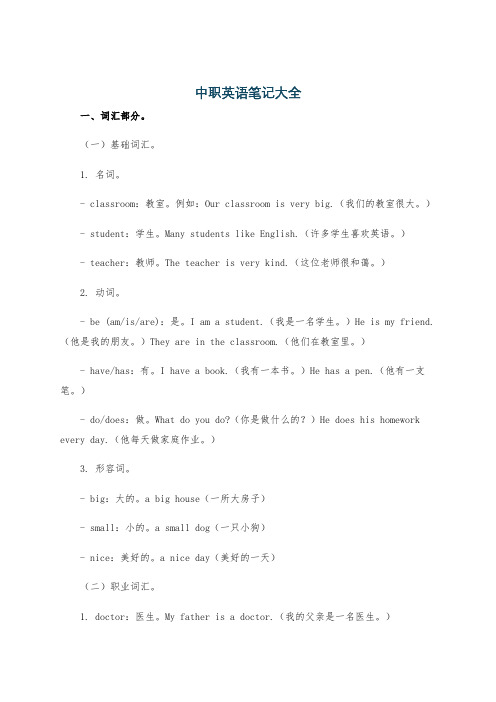
中职英语笔记大全一、词汇部分。
(一)基础词汇。
1. 名词。
- classroom:教室。
例如:Our classroom is very big.(我们的教室很大。
)- student:学生。
Many students like English.(许多学生喜欢英语。
)- teacher:教师。
The teacher is very kind.(这位老师很和蔼。
)2. 动词。
- be (am/is/are):是。
I am a student.(我是一名学生。
)He is my friend.(他是我的朋友。
)They are in the classroom.(他们在教室里。
)- have/has:有。
I have a book.(我有一本书。
)He has a pen.(他有一支笔。
)- do/does:做。
What do you do?(你是做什么的?)He does his homework every day.(他每天做家庭作业。
)3. 形容词。
- big:大的。
a big house(一所大房子)- small:小的。
a small dog(一只小狗)- nice:美好的。
a nice day(美好的一天)(二)职业词汇。
1. doctor:医生。
My father is a doctor.(我的父亲是一名医生。
)2. nurse:护士。
The nurse takes care of patients.(护士照顾病人。
)3. worker:工人。
He is a factory worker.(他是一名工厂工人。
)(三)日常用品词汇。
1. book:书。
I like reading books.(我喜欢读书。
)2. pen:笔。
Write with a pen.(用钢笔写字。
)3. ruler:尺子。
Measure with a ruler.(用尺子测量。
)二、语法部分。
(一)一般现在时。
专科大一英语知识点笔记

专科大一英语知识点笔记一、语法知识点1. 时态与语态- 英语中存在一般现在时、一般过去时、一般将来时等基本时态。
- 语态包括主动语态和被动语态,能够根据句子结构和动词形式进行转换。
2. 名词- 名词可以分为可数名词和不可数名词,可数名词有单数和复数形式,不可数名词只有单数形式。
- 名词的所有格通常通过在词尾加上apostrophe和s来表示。
3. 代词- 代词用来取代名词,分为人称代词、反身代词、指示代词、不定代词等。
- 代词可以在句子中作主语、宾语、表语等。
4. 形容词与副词- 形容词用来修饰名词,副词用来修饰动词、形容词或其他副词。
- 形容词和副词可通过在词尾加上-er和-est来表示比较级和最高级。
5. 介词- 介词用来介绍名词与其他单词之间的关系,如in、on、at等。
- 介词短语可以在句子中作状语或定语。
二、阅读理解技巧1. 主旨理解- 阅读一篇文章时需要抓住文章的主旨,理解作者想要表达的核心观点。
2. 推理判断- 阅读理解时,可以利用文章中的线索信息进行推断、判断和推理。
3. 词汇猜测- 遇到不认识的词汇时,可以通过上下文的暗示、词根词缀等来推测其意思。
4. 段落归纳- 通过抓住段落的主题句和关键词,可以快速理解段落的大意和内容。
三、写作技巧1. 句型转换- 通过改变句子的结构和语法,换一种方式表达同样的意思。
2. 连词的使用- 合理运用各类连词(如and、but、because等),能够让句子更连贯、丰富。
3. 使用适当的时态- 根据写作需要,选择合适的时态来表达过去、现在或将来的事件。
4. 逻辑关系的表达- 通过使用连词、副词等词语,能够清晰地表达事件之间的因果关系、转折关系等。
以上是专科大一英语知识点的笔记,希望对你有所帮助。
记得多做习题和练习,加强对这些知识点的理解和掌握。
祝你学业进步!。
最新大学英语课堂笔记
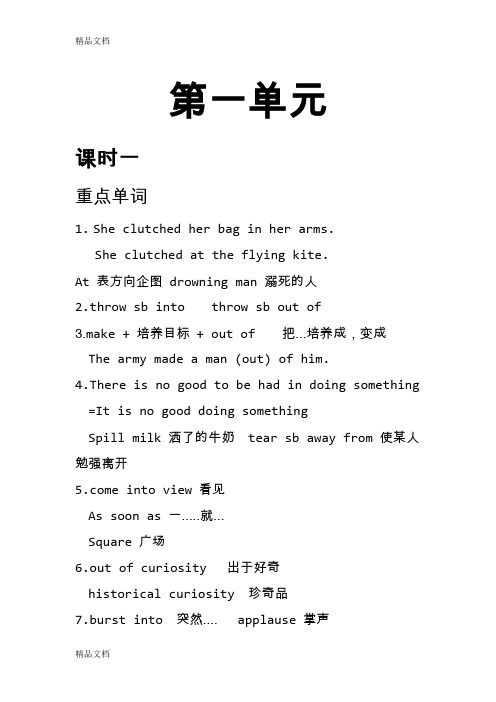
第一单元课时一重点单词1.She clutched her bag in her arms.She clutched at the flying kite.At 表方向企图 drowning man 溺死的人2.throw sb into throw sb out of3.make + 培养目标 + out of 把...培养成,变成The army made a man (out) of him.4.There is no good to be had in doing something =It is no good doing somethingSpill milk 洒了的牛奶 tear sb away from 使某人勉强离开e into view 看见As soon as 一.....就...Square 广场6.out of curiosity 出于好奇historical curiosity 珍奇品7.burst into 突然.... applause 掌声8.sort 分类,安排 sort into 分成 Pile 摞sort his book into two pile9. plot 情节 Intricate plot 复杂情节10.overlook 俯视11.observant adj 遵守规则的be observant of nothing but只有,只不过;无非At present I can do nothing but wait...12.resort to 诉诸于,求助于13.exertion 尽力the exertions of a busy day14.turn toward 转向单词补充Of 说服的1.convince about 说服that 完全相信到2.vast 广阔的 hesitate 犹豫的cling clung 抓住physical punishment 体罚3.rank 队列 form 组织 paradise 天堂pattern 模式 balcony 阳台 roof 屋顶yell 大喊 unclouded 晴朗的fooling around 游手好闲的 rivalries 对抗take advantage of 利用 reference to 提及,关于4.line with 沿...排列in contest of 在比赛的注:contestvt. 竞争,为…而奋争;辩驳 vi. 争斗;竞争;争夺 n. 比赛;竞赛;搏斗课时二短语1.in vain 徒然,无效e to a halt 停止 =stop3.invade 涌入,入侵4.find one’s way to = arrivalRivers find their way to sea.5.take over 接管6.show over 炫耀7.sb in a daze 茫然8.let up 停止,减弱,放松When would the rain let up .9.stretch out 伸出 stretch a hand 伸出手He stretched himself out in the sofa and fell sleep.10.make的短语make sure 确信,证实 make good use of 充分利用make full use ofmake up 弥补,组成,化妆,整理make friends with 与...交友make up for 补偿,弥补 make a differences 有影响make out 理解,辨认出,说明,填写,设法应付make a decision 做决定 make for 导致,有助于,走向 make of 了解,用...制造make in 加入,进入,干涉别人课外补充课文补充1.huge 巨大的庞大的,极大的(体积)2.vast 广阔的,辽阔的(平面)3. 事,事情affair (公共,商业)事物,业务,事态事件,事变,发生的事情4. n 材料,物质matter vi 有重要性的,有重大关系的,要紧化脓,出脓It’s just a matter of time. 这仅仅是个时间问题。
英语课堂学习笔记

英语课堂学习笔记
英语课堂学习笔记
1、同级比较构造as...as之前可用表倍数的.词语修饰。
The boy students in this school are nearly twice as likely as the girl students to say they intend to get a college degree in business.
2、sting:叮。
主语是蜜蜂等;prick:扎,刺。
主语是thorn 荆棘,刺;bite:咬。
主语是mosquito蚊子;stick:刺。
主语是锥子,刺刀等。
3、of 表示相似,“be of..."某人像什么。
She is more of a musician than her brother.
4、miss 后接动名词表示“防止(灾难),躲过”。
The squirrel was lucky that it just missed being caught.
5、to the satisfaction of sb. 使....感到满意。
to+the+抽象名词+of sb.某一行为的结果使某人感到…… to the disappointment of sb.; to the delight of sb.;to the astonishment of sb.。
专科英语笔记大一下知识点
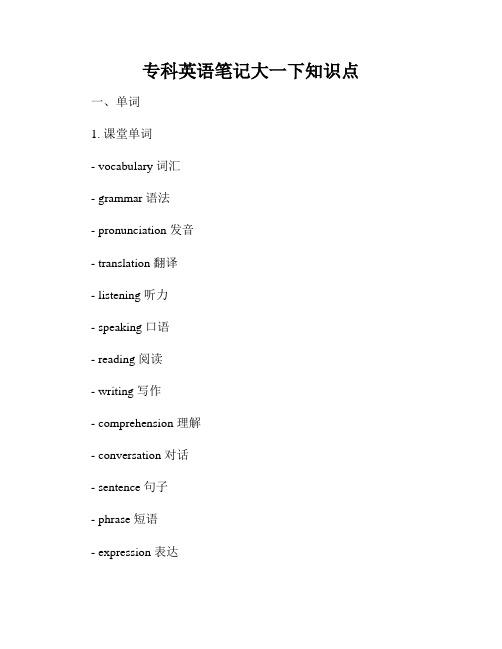
专科英语笔记大一下知识点一、单词1. 课堂单词- vocabulary 词汇- grammar 语法- pronunciation 发音- translation 翻译- listening 听力- speaking 口语- reading 阅读- writing 写作- comprehension 理解- conversation 对话- sentence 句子- phrase 短语- expression 表达- fluency 流利度- accuracy 准确性- structure 结构2. 专业单词- major 专业- minor 副专业- syllabus 教学大纲- curriculum 课程- assignment 作业- assessment 评估- attendance 出勤- transcript 成绩单- lecture 讲座- seminar 研讨会- tutorial 辅导课- thesis 论文- research 研究- experiment 实验- internship 实习- presentation 报告- deadline 截止日期- plagiarism 抄袭二、语法1. 时态- Present Simple 现在简单时- Present Continuous 现在进行时- Present Perfect 现在完成时- Past Simple 过去简单时- Past Continuous 过去进行时- Past Perfect 过去完成时- Future Simple 将来简单时- Future Continuous 将来进行时- Future Perfect 将来完成时2. 名词- 可数名词与不可数名词的区别- 单数名词与复数名词的变化规则- 特殊名词变化规则(例如:man→men)3. 代词- 主格代词、宾格代词、形容词性物主代词、名词性物主代词的用法4. 冠词- 定冠词与不定冠词的用法- 零冠词的用法5. 动词- 动词的分类:及物动词与不及物动词- 不规则动词的变化规则- 动词时态和语态的转换6. 形容词与副词- 形容词与副词的基本用法- 比较级和最高级的构成方法三、听力1. 听力技巧- 预测答案的关键词- 听的时候还要思考问题的类型- 留意同义替换和词意转换2. 常见听力题型- 多项选择题- 填空题- 判断题- 配对题- 笔记/表格/流程图完成题四、阅读1. 阅读技巧- 预览文章结构- 找出关键词- 使用上下文推断词义- 注意细节和修辞手法2. 阅读题型- 判断正误题- 判断态度与观点题- 选择题- 填空题/摘要完成题- 匹配题五、写作1. 写作技巧- 明确写作目的和读者- 组织清晰的段落结构- 使用合适的过渡词和连接词- 注意时态和语法的准确性2. 常用写作句型和表达- 表示原因和结果的句型- 表示对比和比较的句型- 表示观点和建议的句型- 描述类和解释类的句型- 引用他人观点和观点辩论的句型六、口语1. 日常对话- 问候与介绍- 打电话与约会- 购物与餐厅点餐- 旅游与交通- 医院与急救2. 学术口语- 论文报告与学术讨论- 学术会议与研讨会- 学术文献阅读与引用七、翻译1. 翻译技巧- 理解原文的整体意思- 寻找关键词和短语- 注意语法和语序的转换- 保持语言风格和语言表达的准确性2. 常见翻译难题- 词义的多样性与歧义- 文化差异与习惯用语- 固定搭配与翻译准确性八、学习资源1. 课本与教辅书2. 网络资源与学术文献数据库3. 语言学习软件与应用程序4. 语言交流平台与英语角活动以上是大一下学期专科英语的知识点笔记,包括单词、语法、听力、阅读、写作、口语和翻译等方面的内容。
大专英语笔记期末总结

大专英语笔记期末总结First, I want to highlight the main subjects and corresponding topics covered in this semester. As a student pursuing a major in Business Administration, I have undertaken a variety of courses. These courses include Financial Accounting, Marketing Principles, Business Communication, and Human Resource Management.In Financial Accounting, I have learned the fundamental principles and concepts of accounting, such as the accounting equation, double-entry bookkeeping, and financial statement analysis. Through various case studies and practical exercises, I have gained a solid understanding of how to prepare and analyze financial statements. I have also become familiar with different accounting regulations and how they impact financial reporting.In Marketing Principles, I have learned about the key concepts and strategies in marketing. This course has given me insights into market segmentation, target marketing, product development, pricing, promotion, and distribution. I have also learned about consumer behavior and how to conduct market research. These skills will be essential in developing effective marketing campaigns and understanding consumer needs and preferences.In Business Communication, I have learned the importance of effective communication skills in the business world. This course has enhanced my written and verbal communication skills, as well as my presentation and teamwork abilities. I have also learned about different communication mediums and how to adapt my communication style to different contexts and audiences. These skills will be crucial in my future professional endeavors.In Human Resource Management, I have gained a comprehensive understanding of the key principles and strategies in managing human resources. I have learned about recruitment and selection, training and development, performance management, compensation and benefits, and employee relations. This course has equipped me with the knowledge and skills necessary to effectively manage and motivate employees in an organization. Overall, I am satisfied with my academic performance this semester. I have maintained a high GPA and actively participated in class discussions and group projects. However, there is always room for improvement. One area I would like to focus on in the future is time management. I sometimes struggle with balancing my coursework and other responsibilities, which can lead to unnecessary stress and a lack of productivity. To address this, I plan to create a detailed study schedule and prioritize my tasks effectively.In addition to academic achievements, I have also developed important life skills throughout this semester. I have improved my critical thinking and problem-solving skills, as well as my ability to work in teams and adapt to different situations. These skills will be valuable not only in my future professional career but also in my personal life.Looking ahead, I have set some goals for the next semester and beyond. Firstly, I aim to further develop my knowledge and skills in my major field by taking advanced courses andengaging in internships or extracurricular activities related to business administration. This will allow me to gain practical experience and apply the theories and concepts I have learned in real-world settings.Secondly, I want to improve my leadership skills. Being a leader requires strong communication, decision-making, and problem-solving abilities. I plan to join student clubs or organizations where I can take on leadership roles and enhance my leadership capabilities.Lastly, I want to continue expanding my network and building relationships with professionals in the industry. Networking is crucial in today's job market, and it can provide valuable opportunities for internships, job placements, and mentorship. I plan to attend industry conferences, career fairs, and networking events to connect with professionals in my desired field.In conclusion, this semester has been a valuable learning experience for me. I have gained knowledge in various subjects related to my major and developed important skills for both academic and professional success. While I am content with my achievements this semester, I recognize the need for continuous improvement. By setting goals and taking proactive steps to enhance my knowledge, skills, and personal growth, I am confident that I will be well-prepared for future challenges and success in my chosen field.。
英语课堂笔记

词性名词分为可数名词和不可数名词形容词:用来修饰和补充名词副词:补充,说明,修饰动词形容词和其他副词时态一般现在时态:定义:表达经常性,习惯性的动作、行为。
构成:动词原形或三单变化:常与often/usually/sometimes/never/every/everyday/week/year等连用例句:(1)He goes to school by bike every day.=He ride a bike to school every day.表达人的爱好、品质、品格时也要用一般现在时。
(2) He likes playing football.把例一改为否定形式He doesn’t go to school by bike every day.把例二变为一般疑问句并作肯定回答Does he like playing football?Yes he does/(3)We often finish school at five o’clock.How often do you finish school at five?一般过去时态:定义:表达过去发生的行为。
构成:主语+动词过去式变化:常与yesterday/the day before yesterday/last week/last month/last year/two days ago连用例句:(1)I met my good friend in the street yesterday.(2)He worked in Wei Fang two years ago.I didn’t meet my friend in the street yesterday.When did he work in Wei Fang?一般将来时态:定义:表将来某一时间或某一段时间发生的动作或存在的状态。
构成:be going to/will+动词原形常与时间状语:tomorrow/the day after tomorrow/next…In +时间段(多长时间后)After two days过去式In two days一般将来时(1)He will come back in two days.Be going to更强调计划性明年我十四岁了用“will”I will bi 14 years old next year.(2)There will bi a football match tomorrow.现在进行时:定义:现在正在发生或进行的动作。
专科大学进阶英语教材2笔记
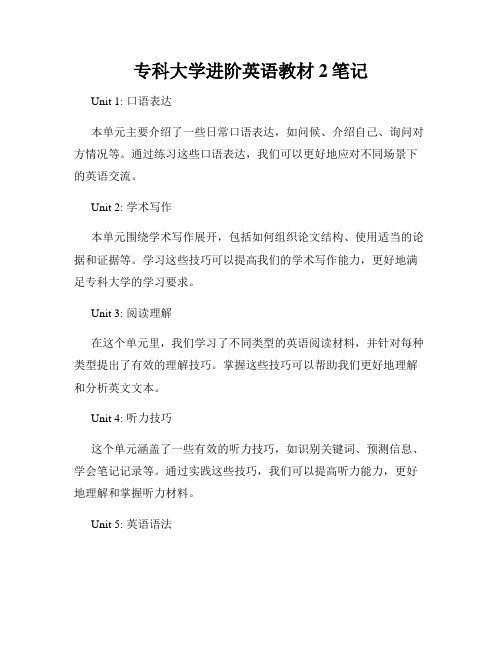
专科大学进阶英语教材2笔记Unit 1: 口语表达本单元主要介绍了一些日常口语表达,如问候、介绍自己、询问对方情况等。
通过练习这些口语表达,我们可以更好地应对不同场景下的英语交流。
Unit 2: 学术写作本单元围绕学术写作展开,包括如何组织论文结构、使用适当的论据和证据等。
学习这些技巧可以提高我们的学术写作能力,更好地满足专科大学的学习要求。
Unit 3: 阅读理解在这个单元里,我们学习了不同类型的英语阅读材料,并针对每种类型提出了有效的理解技巧。
掌握这些技巧可以帮助我们更好地理解和分析英文文本。
Unit 4: 听力技巧这个单元涵盖了一些有效的听力技巧,如识别关键词、预测信息、学会笔记记录等。
通过实践这些技巧,我们可以提高听力能力,更好地理解和掌握听力材料。
Unit 5: 英语语法本单元介绍了一些基本的英语语法知识,如时态、语态、从句等。
这些知识是英语学习的基础,对于我们构建正确的句子和进行准确的表达非常重要。
Unit 6: 高级词汇在这个单元中,我们学习了一些高级词汇,如同义词、反义词、词根词缀等。
通过学习这些词汇,我们可以丰富自己的词汇量,提升表达能力。
Unit 7: 英文写作技巧本单元主要介绍了一些英文写作的技巧,如段落结构、过渡词的使用、语法修饰等。
通过学习这些技巧,我们可以提高英文写作的准确性和逻辑性。
Unit 8: 翻译实践这个单元强调了实践翻译的重要性,通过进行实际的翻译练习,我们可以提高英译汉和汉译英的能力,并尝试应用之前学到的语法和词汇知识。
总结:专科大学进阶英语教材2涵盖了口语、写作、阅读、听力、语法等多个方面的英语技能。
通过学习这些内容,我们可以更好地提高自己的英语能力,为今后的学习和工作打下坚实的基础。
希望大家在学习过程中能够持之以恒,不断提升自己的英语水平。
英语 课堂笔记
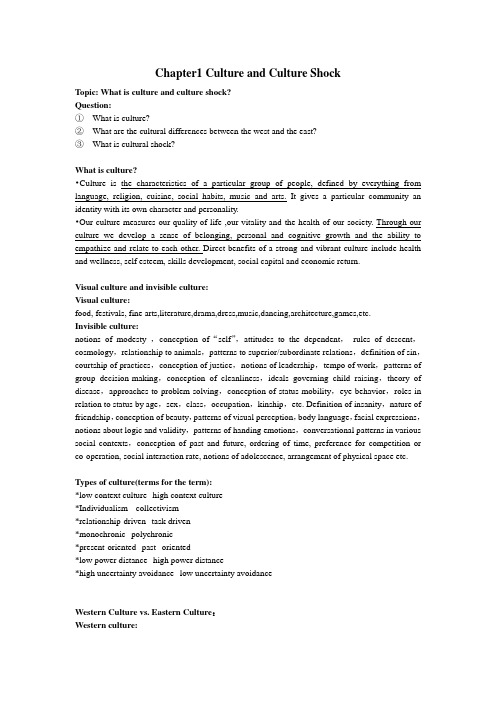
Chapter1 Culture and Culture ShockTopic: What is culture and culture shock?Question:①What is culture?②What are the cultural differences between the west and the east?③What is cultural shock?What is culture?•Culture is the characteristics of a particular group of people, defined by everything from language, religion, cuisine, social habits, music and arts. It gives a particular community an identity with its own character and personality.•Our culture measures our quality of life ,our vitality and the health of our society. Through our culture we develop a sense of belonging, personal and cognitive growth and the ability to empathize and relate to each other. Direct benefits of a strong and vibrant culture include health and wellness, self esteem, skills development, social capital and economic return.Visual culture and invisible culture:Visual culture:food, festivals, fine arts,literature,drama,dress,music,dancing,architecture,games,etc.Invisible culture:notions of modesty ,conception of“self”,attitudes to the dependent,rules of descent,cosmology,relationship to animals,patterns to superior/subordinate relations,definition of sin,courtship of practices,conception of justice,notions of leadership,tempo of work,patterns of group decision-making,conception of cleanliness,ideals governing child raising,theory of disease,approaches to problem solving,conception of status mobility,eye behavior,roles in relation to status by age,sex,class,occupation,kinship,etc. Definition of insanity,nature of friendship,conception of beauty,patterns of visual perception,body language,facial expressions,notions about logic and validity,patterns of handing emotions,conversational patterns in various social contexts,conception of past and future, ordering of time, preference for competition or co-operation, social interaction rate, notions of adolescence, arrangement of physical space etc.Types of culture(terms for the term):*low context culture--high context culture*Individualism --collectivism*relationship-driven--task driven*monochronic--polychronic*present-oriented--past--oriented*low power distance--high power distance*high uncertainty avoidance--low uncertainty avoidanceWestern Culture vs. Eastern Culture:Western culture:The western culture has come to define of European countries as well as those such as the United States that have been heavily influenced by European immigration. Western culture has its roots in the Classical Period of the Greco-Roman era and the rise of Christianity in the 14th century. Other drivers of Western culture include Latin, Celtic, Germanic and Hellenic ethnic and linguistic groups. Today ,the influences of Western culture can be in almost every country in the world. Eastern culture:Eastern culture generally refers to the social norms of countries in Far East Asia(including China, Japan, Vietnam, North Korea and South Korea )and the Indian subcontinent. Like the West, East culture was heavily influenced by religion during its early development. In general, in Eastern culture there is less of a distinction between secular society and religious philosophy than there is in the West.Second part: culture shockCulture shock refer to the emotional status (confusion, loneliness, disorientation, depress, hostility, etc.) and the possible consequence of physical uneasiness (one person has when getting to live in a completely new culture or society)Mainly four stages: honeymoon, negotiation, re-integration/adjustment, autonomy/masteryReading 11: What is a multicultural person?2~3: Multicultural salesperson is better than multilingual or monocultural salesperson in motivating foreign customers.4~8: Candidate‟s multiculturalism is an important ingredient to success.9: A multicultural person should touch with the spirit of the new culture not just its superficial details.Comprehension Questions:1. How would a foreigner respond to a monocultural salesperson according to the passage?Answer: foreigner sense monocultural arrogance at once and set up their own barriers, effectively blocking any attempt by the monocultural person to motivate them.2. What are the usual qualifications that clients use to recruit a manager for their foreign branch?What does the author think of it?Answer: A multilingual salesperson with the same qualities they would want for domestic position. The author thinks the manager must be multicultural and must be accepted throughout Europe.3. How would the author try to determine whether a candidate is multicultural or not? Give atleast one possible question.Answer: Ask a lot of questions about candidates early childhood, looking for evidence of contact with diverse cultures. S uch as …What do you think about Europe.4. Why would an American businessman still feel like a bull after learning some popularcustoms in Japan?Answer: Because he only learns about the culture intellectually, but refuse to penetrate it emotionally.5. Do you think you are a multicultural person? Why or why not?Answer: Yes, I think I am a multicultural person. I love traveling, I went to Liaoning province and Heilongjiang province this winter vacation, and I enjoy the climate food andhe way they talk with each other there, I think it is so wonderful to talk with peoplewho lived in another cultural.6. What kind of preparation should be involved if you are recruited to work in a country of adifferent culture?Answer:①Throw your arrogance.②Learn about the language, customs, festivals and so on.③Psychologically prepared.④Get in touch the spirit of the culture.Cultural notesBritish Table MannersA French saying suggests that, “while the English have good table manners, the French know how to eat.” It is indeed a fact that while the English attempts to push peas on to his fork, the Frenchman turns the forks upside and uses it more as a spoon, thus accelerating the process of eating and enjoying-albeit without scoring highly on etiquette.Terms of endearmentThe visitor to Britain is sometimes astonished to be addressed in rather in intimate terms. In southern England, on the buses and in the shops, you may very well be addressed as “love”, “lovely”, “dear”, “darling”, “pet” or “petal”-and perhaps, if you are lucky, ”my lover” in Devon.Reading 2Stereotypes: A fixed general image, characteristic, etc. That a lot of people believe to represent a particular type of person or thing‟ (Collins Cobuild Dictionary)When someone claims that members of another culture all share the same, often inferior or offensive characteristics.Case AnalysisThi s conflict could be attributed to the man‟s monocultural arrogance and stereotyping.The young man insists on classifying/stereotyping the lady to nonnative American due to her asian appearance, and he denies being a native American but rather a regular American. Both reveals his arrogance of being white American. Actually he is only the third generation of immigrants while the lady being the fourth. Beside, his poor knowledge of Korea culture also tells us he is not multicultural. So the lady gets irritated, sets up a barrier for further communication and tries to revenge by her poor imitation of a British.This proves stereotyping and arrogance about one‟s own culture will intervene cross cultural communication and lead to disasters.Reading 31. What‟s t he intention of author by telling that story?2. What may we pay attention to in leaning polite and appropriate behavior in another cultureaccording to the passage?Answer: Some well-meaning articles and presentations on cultural differences have a potential to do more harm than good and may not be as amusing.3. Why shall we learn about cultural differences?Answer: Paying attention to customs and cultural differences can give someone outside that culture a better chance of assimilation or acceptance. Ignoring these can get anunsuspecting person into trouble.Conclusion: Attitude in learning culture?1. Believing all cultures are equal.2. Enjoying learning about the spirit of another culture through more contacts.3. Being careful with generalizations from anybody including yourself. It may be wrong.4. Don‟t apply generalizations to everybody in that cultureFirstly, we should write an attribution.The Case analysis:Secondly, we can analyse the case by their language and Behavior.Thirdly, sum up and make a conclusion.Answer for question2, reading 1:Student‟s answer:1. Learn about another culture2. Penetrate the culture3. Get in touch with the spirit of that cultureTeacher‟s answer:1. Throw your arrogance2. Learn about that culture3. Psychologically preparedChapter Two ValuePart I Introduction:right—wrong, desirable—undesirable, normal—abnormal, proper—improper Movie(Gua Sha)Topic1:the behavior against law: hit child‟s face, lie on the court , steal the boy out, leave the boy alone at homeCultural differences: idea of SunWukong, conception of familyTopic 2:Sun WuKong‟s imageChinese interpretation of Sun Wukong: good, hearty compassionate righteous here; example of traditional values and ethics.The lawyer: murderous,vulgar,deviousTopic 3:Analysis: reason behind1.Different child-parent relationship->Parents‟ duty to child->Adults‟ duty to their senior parents*Different ideal individualAMERICAN: rugged individualist->independent individual who is responsible for their own situation in life. He can set their own aims and occupation to become free and self-reliant or even stand out from the crowd.CHINESE: collectivist-> a member of a close-knit, interdependent family, nation or any other collective who is always concerned about the opinions of parents, with following traditions, and with full of obligations to others.2.Diffent attitude to law->Relationship-oriented->The rule of lawTopic 4: who is monoculture? Who is multicultural?Monoculture: the nurse from the hospital, grandpa, CMA lawyer.Multicultural: Datong, JianNing, Quinlan, judge.Part II Case StudyQ1: Why is the Egyptian horrified?A1: Because in his society, obligations to parents and siblings are an important part of daily life. But Mr. Wilson, who otherwise seems like a pleasant and generous person, stand to have his mother living in a nursing home full of frail, elderly people. Part III Readings:▲Reading 1:American values and assumptions:A. Individualism.B. Privacy.C. Equality.D. Informality.E. Directness and assertiveness1.Conception of being alone:B(A),para 12-132.Notion of child-raising:A(B),para 2,3,4,9,133.Body language:D E,para 19,254.Approach to conflicts:E,para 235.Conception of confidentiality:B,para 146.Notion of competition:A(C),para 11munication in work:E,para 258.Attitude towards waiters/waitresses:C(D),para 16,189.Conception of hero:A,para 7rmal dresses of higher status person:C D,para 16,2011.Notion of social class:C,para 1712.Responses to asking for favor:A,para 10Added Core American values: cooperation and fair play,time and efficiency,material wealth and hard work.▲Rreading2:The ABCs of the USAQ1.Which one impresses you most?Q2.According to the author, how does the American use of first names confuse Europeans?A2: In Europe, people progress in a natural and orderly way from the use of last names to the use of first names. Here, it‟s first names at first sight. This can cause confusion for Europeans.Q3.Why does the author suggest a visit to a hardware store? What does that tell us concerning American values?A3: From the do-it-yourself pioneer spirit through a love of comfort that absolutely astonishes most foreigners, these temples of American capitalism reveal a whole range of American values.Q4.What does the last sentence of the text mean?A4: although it may not be the best, America is aggressive, and they have a big dream to gain more.Q5.Anything you don‟t understand?▲Reading 3:A Foreign Anthropologist‟s Observation of AmericansFurther discussion: American Dream——Life should be better and richer and fuller for everyone, with opportunity for each according to ability or achievement.Q: What kind of American values are supporting Americans believing in their American Dream?A: Every one except INFORMALITY▲Reading 4:Cheating as Culture: Insights for Foreign TeachersQ1: Why do Polish cheat so often?A1: (1)It‟s unthinkable to refuse help to a friend in need.(2)The ability to use one‟s wits to escape from difficult situation has alwaysbeen highly valued in Polish.Q2: Can these reasons be used in Chinese ?A2: (1) is OK. (2) is not .▲Reading 5British Culture: Who are the British? What are they like?Something about Britain: parliament, double-deck bus, newspaper, royal guards, soccer, cycling, lollipop lady/man.Chapter3Review of mid-termFind out key words and you will get higher scores.e.m.Iceberg(key words): invisible, visibleWhy do polish students cheat: group-oriented society, honor, heroIntroductionCommunication can be classified into verbal communication and non-verbal communication.A telephone conversationVerbal communication A group discussionA newspaperA smileNon-verbal communication An ok gestureA handshake …Passage 1Q:How is the volleyball game different from bowling game?When someone hits the volleyball,you should return it.There is no waiting in line and whoever isnearest and quickest can hit the ball.In contrast,when you play bowling,you should wait for your turn and your place in line depends on your relationship with the previous speaker, your social status and so on.If I introduce a topic, a conversational ball , I expect you to hit it back, If you agree with me ,I don‟t expect you simply to agree and do nothing more .I expect you to add something--a reason for agreeing ,another example ,or a remark to carry the idea further. But I don‟t expect you always to agree. I am just as happy if you question me , or challenge, or completely disagree with me . Whether you agree or disagree, your response will return the ball to me .Q:How is westerner agree with others?If you agree with others,you are expected to say something more,just like a reason for agreeing,another example,or the remark to carry the idea further.There‟s no waiting in line . Whoever is nearest and quickest hits the ball, and if you step back , someone else will hit it .No one stops the game to give you a turn .You‟re responsible for taking you own turn and no one person has the ball for very long .A Japanese-style conversation, however ,is not at all like tennis or volleyball , it‟s like bowling .You wait for you turn , and you always know you place in line . It depends on such things as whether you are older or younger, a close friend or a relative stranger to the previous speaker ,in a senior or junior position, and so on .Q:How are westerner and Japanese different in getting a chance to speak?Japanese : The first thing is to wait for you turn ,patiently and politely .When your moment comes, your step up to the starting line with your bowl it .Everyone else stands back ,making sounds of polite encouragement.Westerner: They paid no attention to whose turn it was ,and kept snatching the ball halfway down the alley and throwing it back at the bowler.Q:How is the attitude of the author of picking up a different conversational style ?it‟s no simple matter to switch to another,even if you know the rules.but you can try to understand(hit the ball back).If you have been trained all your life to play one game ,it is no simple matter to switch to another ,even if you know the rules.Tennis ,after all , is different from bowling.Q: When communicating with a westerner, how to carry the conversation further?Actually when you are communicating with a westerner, you two are supposed to begin a game of tennis if it is a western- style conversation. If the westerner come up with a topic which is like a conversational ball, you are expected to hit it back. You can agree or disagree with the topic but remember, do carry the reason, other example or a remark with your comment. And you arealways welcomed to question, challenge or even completely disagree with the westerner. And for the next, your mission is to keep the conversational ball goes back and forth and there is no need to create a new ball.key differences:western:hit the ball back(no waiting in line whoever is nearest and quickest hits the ball.) japanese:place in line and wait for the turn to the starting line with a new ball.Passage 2Low-context cultural Vs high-context culturalQ: what are low-context communication and high-context communication?A: low-contact means that people are expected to pay more attention to the words used in communication than to the context in which things are said.High-context means that people tend to communicate in a way that is more indirect and subtle, and listeners are expected to take more responsibility for interpreting messages correctly. People are expected to pay much attention to the context in which communication takes place-who the speaker is, where and why the conversation is taking place, body language, and so forth-and when people interpret what others mean, they often give more weight to the context than to the actual words said. In fact, people in high context cultures often view direct, explicit communication asA simple story for better understanding of low-context andhigh-context.An American girl lived in a Russian mother‟s home. One day, the girl wanted to go out for a party and she promised the mother that she would come back before 10 o‟clock. But the Russian mother was having a high fever. She said …you may if you can”. At last ,the girl left and the mother was really unhappy. Because the Russian mother was a high-context person, she wanted her to stay athome and take care of her. However , the girl was a low-context person. She thought it means yes. Q: How are western students taught to organize their expository.A: a. The beginning paragraphs with a “topic sentence” that states the point of the paragraphs .b. The article should generally begin with an overview of the points to be made .c. To tell them what you are going to say ,say it ,and then tell them what you said .Case analysisMost Chinese belong to high-context people. They would hide their true feeling. For example in the case, the Chinese couple must be very tired. But they said keyi, means not that tired. It is a way showing respect in China or the host might be embarrassed. But the traveler must be low-context person. Because he expressed that he was extremely tired. In conclusion:1. It may be attributed to different social interaction customs between American and Chinese.(classification)2. Chinese politeness/self-deprecation, American directness (explanation)3. It is very important to learn about different communication styles or the unspoken rules in different cultures.(conclusion)Video analysis(真爱至上片段)Q: Do you anticipate a loving affair between the man and the lady?A: No, most Chinese don‟t agree. Because the lady has already married his best friend. The lady should try her best to be a good wife. And the man should just let her go ,pray for her happiness , forget her and find another lovely girl.Q: What might be the man’s purpose of this confession?A: Maybe he just wanted the girl know that he loved her so much, then he would leave and start a new life.Maybe he just don‟t want to regret , at least he tried.Maybe he had the answer in his mind, he just wanted to say goodbye. √Q: How is this communication different from any Chinese ones under the same circumstance?A: At first, many Chinese boys won‟t let the girl know ,m ost of time they won‟t say LOVE face to face.Then, the man didn‟t say any thing, the paper spoke out instead. A nd the words are warm and funny. There would be less embarrassment, and the girl would feel at ease. But Chinese are easy to cause silence.At last, if a Chinese girl refused, she would say sorry or she would be hard to say so. If a Chinese accepted it ,she wouldn‟t kiss the boy. Most of the time, boys control the time. But in the video, the lady refused the man and kissed him.Discourse convention and strategiesThe first Chinese praised the chairman at first, saying that is a right decision to buy a new machine and it really benefit a lot. Then he carefully expressed his thought that they don‟t need to hire new stuff.The second Chinese was much more implicit. He did n‟t expressed his idea directly. He said we‟ve spent too much on ads and magazines, and we should cut down the money on that, which means we don‟t have enough money on those things and how could we spent money on hiring new stuff? Chinese are such high-context people that it is too difficult for foreigners to understand. In China, it is important to save face. They are afraid to be different, so most of time they will hide their opinions. In return , it is also important to give face, and they won‟t hurt others in public. Passage 3 and passage 4 didn‟t mentioned too much in the class , doing exercise instead. Here are Q&As and some outline we‟ve done after class.Passage 3Q: When learning a new language,what should we pay great attention to in addition to grammar,pronunciation and spelling?A: We should pay attention to tacit rules of speaking in language.These are not usually studied in a formal manner unlike rules of grammar or spelling.These unspoken rules exists in every language but differ significantly from culture to culture.It involves developing sensitivity to aspects of language that are usually not taught in language textbooks.Some important rules include permissible degrees of directness in speech and forms of politeness used in the daily conversation.Q: What are the differences between Americans and Asians in their attitude toward verbal communication?A: American English strongly emphasizes directness in verbal interaction.Many expressions exemplify indicate impatience with avoiding issues.Indirectness is the rule in parts of the Asians.For example,at a dinner party,the host of Americans occasionally offer food twice but usually not more than that.In the part of the Asians a host is expected to offer food several times.The Americans communication is honest and direct.And Americans interpret silence to mean disapproval,they will try to fill silence by saying something.While Asians might keep silence as agreement.outline of Passage 3Para 1-4:introduction1)Para 1-2: taking thank you as an example ,there are different manners in foreignlanguages.2)Para 3-4:acquiring a second language demands not only learning grammar andvocabulary,but also developing sensitivity to language ,namely unspoken rules. ●Para 5-9: American English strongly emphasize directness in verbalinteraction ,but there are limits to that .especially with people of higher status.●Para 10-11:silence and interruptions is used and interpreted differently as well.●Para 12: each language has a unique way of expressing human needs.●Para 13: condusionSample about Passage 3 and Passage 41.The odd and unnatural English spoken by foreigners is attributed to their accent and lack of vocabulary. FReason: Actually,there are substantial difference in certain verbal conventions and strategies.2.Silence and dominance in a conversation are not appreciated in America.T3.It’s a good idea to drop in and visit your American neighbor when you know s/he is free at home. FReason:Of course , there are limits to the degree of directness a person is allowed to express ,especially with people of higher status such as teachers and employers.4.Self-deprecation is applied when Britons are responding to compliments. F5. An ambiguous invitation is a regular practice in English-speaking cultures, always involving the using of indefinite adverbs like “some time” FReading 4 Social Interaction Customs1. The differences of “greeting and farewells” between westerners and Chinese●W hen westerners meet each other, the English prefer to say “good morning”and “good evening”, however, the Chinese tend to say “Hello”. Yet the Chinese also have other greeting formulate, such as “have you eaten”, or “have you had your lunch”.●Saying good bye is also different. The Chinese usually announce theirdeparture and say “I‟m sorry to have taken up so much of your time.” In contrast, the English usually announce their leave by saying “I‟d better be going.”●When taking leave, the Chinese generally say “请留步” to avoid having thehost accompany them to the door. However, it‟s very common for the Chinese host to see the guests off until they are out of sight.2 .The distinction between ambiguous and unambiguous invitation●An ambiguous invitation is a regular practice in English-speaking culturesand is just a way to maintain social relationships between acquaintances. This is evident in the use of indefinite adverbs like “soon”, “some time ”, and modalverbs like “should ” and “must ”, which c arry no precise time reference or entail no personal commitment.●In terms of response, the English are very direct about expressing acceptanceor refusal of the invitation, whereas the Chinese tend to be indirect and give a uncertain response with courtesy.3 .The three differences between appointments and visiting●The English are quite keen on punctuality but the Chinese Chinese are moreflexible with time.●The Chinese to call on people early in the morning, late at night, or duringweekends. As English-speaking cultures cherish these momnts as private, intercultural misunderstanding is likely to occur.4The differences in compliments and Responses●The westerners can use compliments to start a conversation. In contrast, inChinese culture, complimenting someone on their appearance just happens between females or couples,●Chinese people also compliment others on their possessions, but they have atendency to ask about the price of possessions afterwards, which seems very offensive to westerners.● A striking feature of Chinese response to compliments is their theirself-deprecation, so when people say “It‟s just an old dress”. The Chinese will give credit to others or simply play dhown their achievement. However such modesty may be understood as hypocrisy or fishing for more compliments by a westerners.4 .Some wordsAmbiguous 模糊的Unambiguous 不模糊的Chapter4Clip 1 : Importance of nonverbal communication1.Why is nonverbal communication important according to the expert ?①People will express their emotion from the body language or the facial expression.②He can distinguish whether the man is telling the truth from his nonverbal communication.2.Why would the expert be able to help in getting information from the criminal?①When they ask the man some questions. They can judge the word from the nonverbal communication just like gesture or facial expression.②From the knowledge of psychology , people can get more information from people‟s nonverbal communication than verbal communication.DID YOU KNOW?One study done in the united states showed that 93% of a message was transmitted by the speaker‟ tone of voice and facial expressions. Only 7% of the person‟s attitude was conveyed by words.As a matter of fact , we express our emotions and attitude more nonverbally than verbally.Passage structure:Para 1-6 : Nonverbal behavior convey important information.Para 7-9 : There are cultural differences in nonverbal communication and we are often ignore it.Pare 10-13: Carry meanings in different cultures.Para 14-17: Our faces reveal emotions and attitudes, but we should not attempt to “read” people from another culture as we would …read ‟ someone from our own culture. The key is to try not to judge people whose ways of showing emotions are different.Para 18-20: Appropriate degree of eye contact in American is too intense .Para 21-24: “Body bubble”is determined by relationship and social conversation. Para 25-26: conclusion why we have to learn and imitate language from other culture? The different meanings of the same gesture.Just like the gesture:UK&USA = OKJAPAN = MONEYRUSSIA= ZEROBRAZIL= INSULT。
大学英语课堂笔记

第一单元课时一重点单词1.She clutched her bag in her arms.She clutched at the flying kite.At 表方向企图drowning man 溺死的人2.throw sb into throw sb out of3.make + 培养目标+ out of 把...培养成,变成The army made a man (out) of him.4.There is no good to be had in doing something=It is no good doing somethingSpill milk 洒了的牛奶tear sb away from 使某人勉强离开e into view 看见As soon as 一.....就...Square 广场6.out of curiosity 出于好奇historical curiosity 珍奇品7.burst into 突然.... applause 掌声8.sort 分类,安排sort into 分成Pile 摞sort his book into two pile9. plot 情节Intricate plot 复杂情节10.overlook 俯视11.observant adj 遵守规则的be observant ofnothing but只有,只不过;无非At present I can do nothing but wait...12.resort to 诉诸于,求助于13.exertion 尽力the exertions of a busy day14.turn toward 转向单词补充Of 说服的1.convince about 说服that 完全相信到2.vast 广阔的hesitate 犹豫的cling clung 抓住physical punishment 体罚3.rank 队列form 组织paradise 天堂pattern 模式balcony 阳台roof 屋顶yell 大喊unclouded 晴朗的fooling around 游手好闲的rivalries 对抗take advantage of 利用reference to 提及,关于4.line with 沿...排列in contest of 在比赛的注:contestvt. 竞争,为…而奋争;辩驳vi. 争斗;竞争;争夺n. 比赛;竞赛;搏斗课时二短语1.in vain 徒然,无效e to a halt 停止=stop3.invade 涌入,入侵4.find one’s way to = arrivalRivers find their way to sea.5.take over 接管6.show over 炫耀7.sb in a daze 茫然8.let up 停止,减弱,放松When would the rain let up .9.stretch out 伸出stretch a hand 伸出手He stretched himself out in the sofa and fell sleep.10.make的短语make sure 确信,证实make good use of 充分利用make full use ofmake up 弥补,组成,化妆,整理make friends with 与...交友make up for 补偿,弥补make a differences 有影响make out 理解,辨认出,说明,填写,设法应付make a decision 做决定make for 导致,有助于,走向make of 了解,用...制造make in 加入,进入,干涉别人课外补充课文补充1.huge 巨大的庞大的,极大的(体积)2.vast 广阔的,辽阔的(平面)3. 事,事情affair (公共,商业)事物,业务,事态事件,事变,发生的事情4. n 材料,物质matter vi 有重要性的,有重大关系的,要紧化脓,出脓It’s just a matter of time. 这仅仅是个时间问题。
高职英语笔记
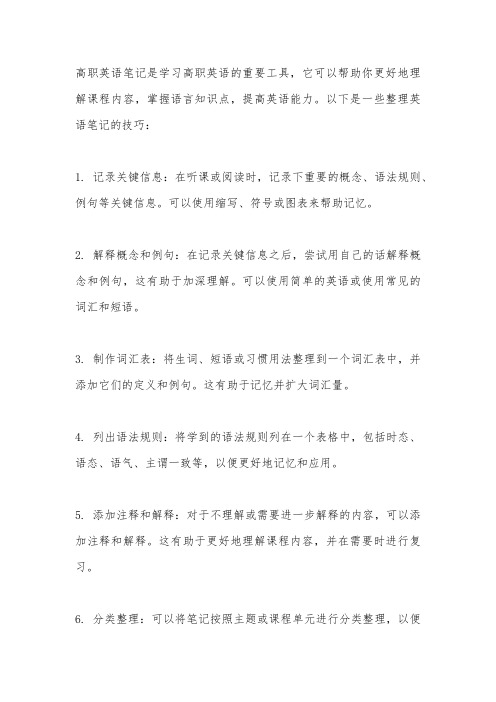
高职英语笔记是学习高职英语的重要工具,它可以帮助你更好地理解课程内容,掌握语言知识点,提高英语能力。
以下是一些整理英语笔记的技巧:
1. 记录关键信息:在听课或阅读时,记录下重要的概念、语法规则、例句等关键信息。
可以使用缩写、符号或图表来帮助记忆。
2. 解释概念和例句:在记录关键信息之后,尝试用自己的话解释概念和例句,这有助于加深理解。
可以使用简单的英语或使用常见的词汇和短语。
3. 制作词汇表:将生词、短语或习惯用法整理到一个词汇表中,并添加它们的定义和例句。
这有助于记忆并扩大词汇量。
4. 列出语法规则:将学到的语法规则列在一个表格中,包括时态、语态、语气、主谓一致等,以便更好地记忆和应用。
5. 添加注释和解释:对于不理解或需要进一步解释的内容,可以添加注释和解释。
这有助于更好地理解课程内容,并在需要时进行复习。
6. 分类整理:可以将笔记按照主题或课程单元进行分类整理,以便
更好地查找和使用。
7. 定期复习:定期复习笔记可以帮助巩固记忆,加深理解,并避免遗忘。
可以在课后、考试前或其他合适的时间进行复习。
总之,整理高职英语笔记是一个积极的学习过程,它可以帮助你更好地掌握课程内容,提高英语能力。
通过记录关键信息、解释概念和例句、制作词汇表、列出语法规则、添加注释和解释、分类整理以及定期复习等方法,可以有效地整理和利用英语笔记。
- 1、下载文档前请自行甄别文档内容的完整性,平台不提供额外的编辑、内容补充、找答案等附加服务。
- 2、"仅部分预览"的文档,不可在线预览部分如存在完整性等问题,可反馈申请退款(可完整预览的文档不适用该条件!)。
- 3、如文档侵犯您的权益,请联系客服反馈,我们会尽快为您处理(人工客服工作时间:9:00-18:30)。
4月20号:重点是辅音音标:见课本P2 元音、辅音表1、首先学会按照元音来划分音节。
在26个字母中,a 、e、i 、o 、u 5个字母为元音字母。
只有1个元音的属于单音节词,有2个元音属于的是双音节词,有3个元音的属于元音的属于3音节词,有3个以上元音的属于多音节词。
4月23号bottle s swim s basin s浊辅音加s 读音为[z] map s清辅音加s 读音为[s]2、开音节:元音字母+辅音字母+不发音的e 比如:date [deit]中的e 不发音、life、nice以元音字母结尾:入to he闭音节:元音字母+辅音字母=闭音节(无不发音的e) win get区分开音节闭音节的意义:1,重读:开音节:重读的时候元音发音标本音闭音节:重读的时候不发字母的本音。
2,词性的转变:如果是属于重读闭音节的话,结尾辅音字母要双写:如win (动词转化为名词)的时候双写n 就成了winner winning 如果不是重读闭音节,那么就不用双写。
音标部分的重点内容就是:重点看看词汇表,因为几乎所有的词汇都是出自于词汇表。
P42 动词及物动词:I red newspapers every day. She studies English very hard.助动词:We do not speak English . We run every morning .系动词:一般现在时:am is are 过去时:was were 现在分词:being 过去分词been 情态动词:can must may 情态动词后第一个动词要用原形如:be作业:掌握P42-43 背P272 不规则动词表名词名词部分需要掌握的内容是1:P12 名词单数变复数的规律(重点)第4—6条集中记忆2:可数名词及不可数名词的划分3:名词的所有格形式。
4:P273 不规则动词表练习题P9—P10 语音题巩固语音内容。
5月31号:重点是名词的所有格及不定代词。
一.课前检测:1.把下列名词变为复数形式(自己做,然后对照课本)roof, hero, foot, sheep, Japanese, boy friend, woman teacher, map.2.给词尾注上音标。
bag s, bottle s,orang es, car s, potato es.二.课本第13页(7)重点看一下,of后面如果是不可数名词,如two cups of tea,只在cup加s,tea不加s。
of后面如果是可数名词,如two boxes of apples, box和apple都要加s.4.名词所有格有两种形式,一种是加’s,另一种是用of.一般指有生命的,用’s,如李华的书,LiHua’s book.没有生命的,用of, 如桌子的腿,the leg of the table.还有特殊的,看课本上。
三.做课本14页练习题(后面有答案)练习里的词组:around the world 全世界,have a look at看一下,have a discussion讨论一下,pull out拔掉,according to根据,airport regulation机场规则,carrying-on baggages随身携带的行李,weather report天气预报,look forward to盼望,at the age of eighteen在十八岁的时候,put off推迟。
16页14,15小题,police, cattle 都是表示整体,本身就是复数,不用加s,但表示数量很多,所以答案都是D。
四.17页2,4部分物主代词和不定代词是重点。
2.物主代词有两种,形容词性物主代词和名词性物主代词。
如:my 与mine 的区别This is my book, and that is mine, too. mine就相当于my book.4不定代词,有九组需要区分(1)some表示“一些”,常用于肯定句中。
any 表示“任何”,常用于否定句中(2)all表示“都”,常用于三者以上肯定。
none表示“都不”用于三者以上否定(3)both“都”用于两者肯定,neither“都不”用于两者否定,either“任何一个”表示两者。
(4)another“另一个”不限定数量,the other“另一个”限定两者,the others“另一些”(5)many“许多”可数名词,much“许多”不可数名词(6)little“很少”,视作否定,a little“有一点”肯定(7)few,a few与上面(6)相似。
(8)every“每一个”强调整体,只做定语each“每一个”强调个体,可作主语,定语,宾语。
(9)one替代可数名词,that替代不可数名词。
6月7号课堂记录:复习第18,19页课前检测:(从括号中选择正确的答案)1.Jack, Sue and I will (both, all, neither) go to the park.both表示两者,all表示三者或三者以上,neither表示否定,两者都不。
2. I asked two people to help me start my car, but (none, both, neither) of them knew what to do. none表示三者以上都不,both表示两者都,neither表示两者都不。
3. There are two people, one is a doctor, (the other, another) is a teacher.the other有限定条件,another另一个,无前提限定条件。
4. ----How (much, many) should I pay?----Three dollars.虽然dollars是用复数,但上面是问应付多少钱,应用much .看课本21页6.关系代词引导从句。
小测验:一.将下面的两个句子合成一句。
1.Do you know the man ? The man came to get the computer .Do you know the man who came to get the computer ?2.The young man came in . They were talking about him.The young man whom they were talking about came in .3.Is this the student ? His mother has gone to America.Is this the student whose mother has gone to America ?二.把下面的从句分成单句。
1.The boy who gave you the letter is my brother.The boy is my brother. The boy gave you the letter.2.They are boys with whom I went to school.They are boys. I went to school with them.注意:介词提前时不可用that, 介词不与that连用。
作业:做124页2.(1)---(7)286页六,1.阅读短文并背过。
短文中单词词组:crowded 拥挤的,vacant空的,get off下车,next stop下一站,take my seat 坐我的座位,silent沉默的,thankful感激的,seat chair座椅,still仍然,pretend to 假装。
6月14号三、冠词(一)基本分类:不定冠词:a、an 定冠词:the、(二)表示类别:表示一类:在可数名词单数前加a、the 或者用名词复数表示一类事物:1、A horse is a useful animal. 2、The computer is a wonderful machine . 3、Desks and chairs are usually made of wood.冠词+形容词表示一类人:rich----the rich 富人poor------the poor 穷人old----the old老者dead---the dead 死者Who invented the telephone ?谁发明了电话?This is the book I bought yesterday .我昨天买的这本书。
Do you like dogs? 你喜欢狗吗?A doctor must like patient .医生必须不讨厌病人1、Have you seen a pen ? I left it here yesterday.2、Is it a black pen? I think I saw it somewhere .你看到我的钢笔了吗,我昨天放这里了。
是支黑色的吗?我好像在什么地方看到过。
3、The way needs a whole day . So we must prepare a packed lunch..需要一天的路程,所以我们必须准备份中午的盒饭。
(三)定冠词的应用:1、加定冠词的:世界上独一无二的事物The earth 地球the moon 月亮the sun 太阳2、在一些公用事业的名称之前:the museum 博物馆the post office 邮局3、用在乐器的名称前:the piano 4、用在序数词、形容词或副词的最高级前:the nearest the fist 5、专有名词前:the Red sea不用冠词的情况:1、专有名词:泛指的抽象名词和物质名词前2、在星期、月份、季节、节假日前3、在称呼、头衔职务前4、在三餐、球类名称前练习冠词和不定冠词:(在横线上适当的位置填上a,an,the)1、______ life is complicated . 生活丰富多彩2、She is got two children . a boy and a girl ,_____ boy is fourteen and ____ girl is eight . 她有两个孩子,一个是男孩十四岁了,一个是女孩八岁了。
3、She loves _____ music . 她喜欢音乐4、Mr. Smith was _____ chairman of the committee .He was ____ strictman, but we all loved him.斯密斯先生是委员会主席,他是一个严肃的人,但我们都喜欢他。
